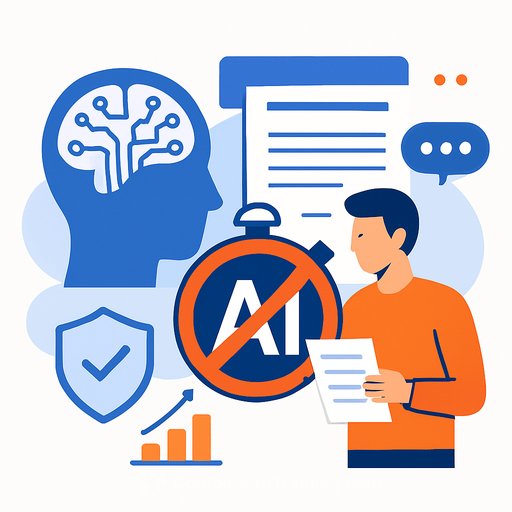Write First, Ask AI Second: Keeping Your Voice When Everyone Outsources Words
How tall is the Eiffel Tower? What can you cook with semolina and a handful of pickles? Is a hippopotamus stronger than an elephant? Type ten words and a question mark and a chatbot will answer with confidence. It often sounds right. Sometimes it is.
That ease is why more writers are delegating. An OpenAI study reports that a notable slice of prompts ask for edits, critiques, fiction, or even personal messages ghostwritten on the user's behalf. The line between "assistant" and "author" is getting blurry.
Delegating writing vs. delegating thought
Writing isn't just transmitting information. Writing is thinking. It's how you wrestle with ideas, find the argument, and cut what's weak. Offload too much of that and your mind gets soft.
Philosopher Eric Sadin warns of "the opportunity to stop exercising [our] fundamental faculties, foremost among them the ability to speak and write in the first person." He asks: "Do we realize that a life deprived of the expression of our faculties and of active connections with others can only foster sadness, bitterness and madness?" Source.
Ed Zitron puts it plainly: "A writer doesn't just 'write words.' They jostle ideas and ideals and emotions and thoughts and facts and feelings... Good writing is a fight, at the very least, driven or inspired by a given emotion - which is something that an AI simply can't replicate." Read his piece.
What this means for working writers
Your value isn't keystrokes. It's taste, judgment, and the thinking you do before the draft. Tools can help, but the core work has to stay yours. Here's a simple framework that protects your voice while using AI well.
- Assign jobs: you vs. the tool. You own the idea, argument, structure, and voice. The tool can assist with outlines, fact checks, trims, or variant headlines. Make that split explicit before you start.
- Write a zero-draft without AI. Ten to thirty minutes, fast and rough. Capture the thesis, key points, and a few lines you actually feel. This forces original thought before any model colors it.
- Use AI as a lens, not a pen. Ask for counterarguments, gaps, edge cases, and reader objections. Don't let it finish thoughts; use it to pressure-test yours.
- Keep a voice bank. Save phrases, metaphors, rhythms, and rules you use. Feed those as constraints when you request edits so suggestions fit your style, not generic internet prose.
- Run a three-pass edit. Pass 1: clarity and cut. Pass 2: structure and flow. Pass 3: polish (titles, snippets, CTAs). A model can propose options for each pass, but you choose.
- Add one lived detail per section. A number, scene, or example from your experience or reporting. This is where voice shows up and where AI can't fake it.
- Set friction rituals. 25 minutes offline drafting. Notes by hand. No prompts until after pass 1. Small constraints protect deep work.
- Source like a pro. For facts, cite primary or respected sources. Ask the model for leads, then click through and verify. Never copy claims without a link you've checked.
- Disclose when appropriate. If a client or editor expects original-only work, say how you used tools (e.g., headline options, grammar pass). This builds trust.
- Keep a "no-AI day." One day a week where you write and edit fully solo. It keeps your edge sharp.
Where AI actually helps
Writers don't need another sermon or another shortcut. You need leverage that doesn't cost your voice. These moves tend to pay off:
- Outline variations: Ask for three alternate outlines to stress-test structure. Merge the best parts into your plan.
- Idea expansion: Feed in a thesis and ask for reader objections and uncommon angles. Keep those that spark a real take.
- Compression and clarity: Paste a paragraph and ask for a 30% cut without losing meaning. Compare, then revise by hand.
- Headline batches: Request 20 options with your voice rules. Strip the clickbait and keep the clean hitters.
- Style audits: Ask where your draft sounds generic, passive, or bloated. Fix those spots yourself.
Guardrails that protect your thinking
- No blank-page prompting. Don't ask for full drafts. You'll inherit structure, tone, and clichés you didn't choose.
- Never publish first suggestions. Model outputs are starting points, not finished work.
- Quote humans, cite sources. If a claim matters, verify it. If a line sings, make sure a real person wrote it-and credit them.
- Keep emotion in the loop. If a section doesn't make you feel anything, rewrite it before you ask for edits.
The point
AI can draft words. Writers shape meaning. If you give away the struggle, you give away the thing that makes your work worth reading. Keep the fight. Use the tools to challenge your ideas, not to replace them.
If you want structured ways to learn prompt tactics and editing workflows without outsourcing your voice, you can browse practical options here: Prompt Engineering and Courses by Job.
Your membership also unlocks:





